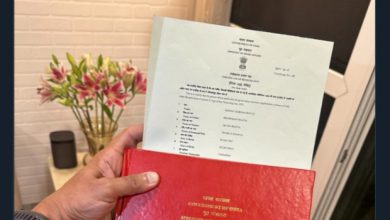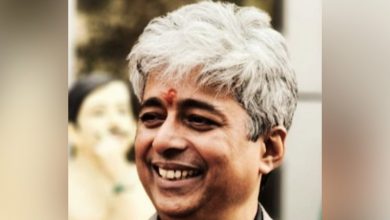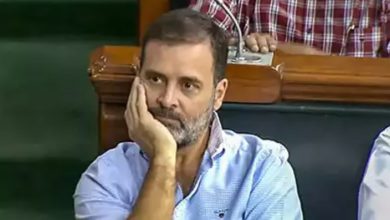Gujarat election 2017: Whatever the result, Congress now has a new and improved model of revival

What does the Congress party stand for? The party and its leadership have been clueless about their identity for some time. In the ongoing Gujarat election might lie some answers.
The new identity of the Congress, as seen in Gujarat, harks back to the original idea of the party: An umbrella organisation that contains within it disparate interest groups. Their interests often clash with each other, but the party’s central leadership manages them on a day-to-day basis. In doing so, the Congress party acts as what its British founder described it as: A safety valve.
India’s size and diversity needs such safety valves to keep it together. Prime Minister Narendra Modi has articulated the idea with the slogan ‘Sabka Saath Sabka Vikas’. In practice, the BJP has only been opening up rather than alleviating social tensions.
Whatever the result of the Gujarat elections, even if the Congress loses badly, its campaign here has shown an ability to once again be the umbrella party, seeking votes of diverse social groups known not to be very fond of each other.
This is surprising because lately, it has been the Modified BJP that has been seeking to co-opt everyone.
Veteran Gujarat commentators like Aakar Patel have written of the impossibility of Patels voting for the Congress. The Patidar community has historically been more anti-Muslim than others, and was actively alienated by Madhavsinh Solanki’s KHAM formula. Consolidating Kshatriyas, ‘Harijans’, Adivasis and Muslims, Solanki saw the Congress win 149 seats in 1985, a record the BJP aspires to break this time.
Led by party president Amit Shah, the BJP’s mishandling of the Patidar agitation for reservations has surprisingly forced many into considering the Congress as an option, never mind that voting for the Congress would make them fellow travellers with a community they detest, the Muslims.
Credit goes to the Congress party, both its state and central leadership, for their adept handling of a social alliance with the Hardik Patel-led PAAS or Patidar Anamat Andolan Samiti.
Had Hardik Patel merged with the Congress, it would have been a loss for both. The Congress has shed its usual arrogance (last seen when in its bargaining with the Samajwadi Party in Uttar Pradesh) and happily gone along with Hardik Patel’s strategy. Hardik is urging voters to vote out the BJP more than vote in the Congress, which in turn has shown the good sense to not let the Congress itself, its secularism or its KHAM alliance, become an issue before Patidar voters.
It would have been easy for the Congress to try an hijack the Patidar movement, using the opportunity to take credit for the agitation. Instead, it has agreed to play junior to Hardik, who is all of 23.
Only two PAAS leaders are contesting from the Congress. The rest of the Congress’ Patel candidates are its own, having earned their laurels with the PAAS movement by contributing to it in their personal capacity.
That was still easy. The Congress has done one better, co-opting OBC leader Alpesh Thakor, whose caste interests clash with the Patidars.
A public secret this election season in Gujarat is that Thakor was propped up by the BJP to counter Hardik. As the Patidars demanded reservations, Thakor led a newly formed OBC-SC-ST Manch. The OSS platform stoked the fear of OBCs losing their reservation benefits if Patidars got some quota too, since the total amount of reservations are capped at 50 percent.
Thakor, a nobody in electoral politics, became too big for the BJP atop soon. He demanded to tickets for himself and his people, but the BJP snubbed him. He joined the Congress in October at a Rahul Gandhi rally.
The Congress has given five tickets to Thakor and his men, and is likely to lose four of those. It’s an electoral loss because the Congress could have given those four tickets to political heavyweights. But the Congress did the right calculation that Thakor would have caused more damage if he was with BJP than the benefits he brings by being within. The BJP’s strategy to do an OBC consolidation to make up for the loss of Patel votes is dented by not having Alpesh, whom they propped up.
Even less influential is the third young man who has hit the headlines, Jignesh Mevani. The Dalit leader, earlier known only in the radical left and NGO circles of Ahmedabad, shot to fame with the Una agitation against cow vigilantes who had beaten up Dalits there.
Mevani is not even well-known amongst Dalits in many parts of Gujarat. He refused to join the Congress, wanting to contest as an independent on a seat where the Congress is strong. The Congress relented because it wants to use that as an opportunity to ingratiate itself with Dalits nationally, even if Mevani isn’t of much electoral consequence in Gujarat.
Gujarat’s Hindu voters are more anti-Muslim than perhaps any other state. Riot after riot has polarised its geography like nowhere else. The Congress has smartly downplayed its secular and Muslim politics to be able to win over other groups.
Despite these untenable disparities in its campaign, reflected in its ticket distribution, the party is not seeing very little internal rebellion.
The Congress party, as we know it today, is not capable of smartly co-opting social movements or managing conflicting interest groups within the party fold, formally or informally. Yet, in this Gujarat election, they have done it. Even if it does not deliver them electoral fruits, the very fact that they’ve been able to do this is a change from a party that has in recent elections appeared listless.







